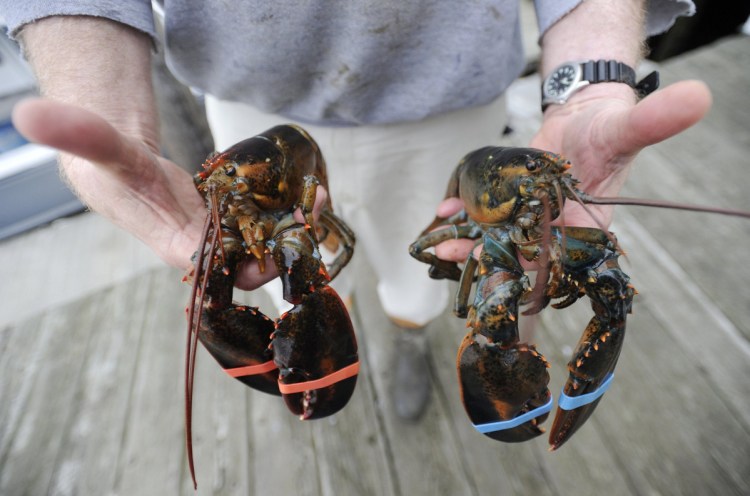A state-funded marketing council is expanding its new-shell lobster crusade to focus on courting the fishmongers who sell seafood, not just the chefs who cook it.
The Maine Lobster Marketing Collaborative plans to appoint a celebrity spokesman, submit a trademark application and create a seasonal calendar to persuade the middlemen of the seafood supply chain to carry Maine soft-shell lobster, which accounts for 80 percent of the state’s annual lobster landings and is deemed by some of the nation’s best-known food bloggers to be sweeter and more tender than hard-shell lobsters fished in Canada.
“We’ve spent four years teaching chefs and consumers about what makes new shell different and special, what makes it a delicacy,” director Matt Jacobson said. “We’re saying new shell, new shell, new shell. We teach, they listen and soon they’re saying it, too. But wanting it’s not enough. They need to be able to buy it. If their supplier doesn’t carry Maine new shell, all the education in the world can’t get Maine new shell on that chef’s menu.”
Now the agency will redirect the bulk of its $2.2 million a year budget away from after-hours chef tasting parties and training sessions toward winning over lobster distributors, the oft-forgotten segment of the supply chain that buys new shell from Maine dealers and sells it to restaurants, hotels, cruise lines and grocery stores. A lack of availability may be the reason Maine lobster is listed on less than 5 percent of restaurant menus, Jacobson said.
It will use the chef excitement for new shell created over the past four years as the foundation for its distributor campaign, but add a few extras to tout its premium, in-demand nature – like establishing a wait list that counts down to the July arrival of new shell to emphasize its seasonality, filing for trademark protection to signal its uniqueness or tapping a new shell celebrity spokesman such as Antoni Porowski, the new food guru of Netflix’s “Queer Eye” series.
But first the collaborative has to learn more about the nation’s wholesale food buyers, which Jacobson said number as many as 350,000, in every major city and region. The collaborative will use online surveys, website tracking and paid ads in targeted trade publications to find out what motivates them, then assuage any concerns they may have about carrying new shell with fact sheets about new-shell handling, yield considerations and usage.
Many distributors worry about the fragility of new-shell lobsters, whose very name reminds a buyer that their shells are not as hard as the Canadian hard shells landed to the north in the winter, Jacobson said. But there are different grades of new shell, ranging from the softest jellies that get shipped straight to lobster processing facilities to so-called firm shells that can survive a trip to Europe in good health, thanks to modern shipping technology.
The collaborative hopes to draw wholesalers and distributors to a new industry-focused site on its Lobster From Maine website, which will provide potential buyers with a list of live and value-added dealers that specialize in Maine new shell. It can’t track how many of those visits turn into purchases, but it will track “high value” actions, such as clicking on the dealer page, downloading dealer information or clicking through to a dealer website.
The collaborative’s board of directors, which is made up of lobster dealers, processors and fishermen, approved its new marketing plan this month by an 8-2 vote. One dissenting vote was cast by Annie Tselikis of the Maine Lobster Dealers Association, a group that has pushed the collaborative to think beyond the summer and fall market for new-shell lobsters and go after larger-volume buyers of both hard- and new-shell lobster on a year-round basis.
The collaborative budget is set by the state Legislature, which this year reauthorized the collaborative for another three years, funded by surcharges and fees on state lobster licenses. Fees range from $165 a year for a lobsterman who fishes alone to $4,000 for the highest-volume processors. Some players in the industry hold more than one license, so they pay into the Lobster Promotion Fund that bankrolls the collaborative more than once.
Penelope Overton can be contacted at 791-6463 or at:
poverton@pressherald.com
Twitter: PLOvertonPPH
Copy the Story LinkSend questions/comments to the editors.




Success. Please wait for the page to reload. If the page does not reload within 5 seconds, please refresh the page.
Enter your email and password to access comments.
Hi, to comment on stories you must . This profile is in addition to your subscription and website login.
Already have a commenting profile? .
Invalid username/password.
Please check your email to confirm and complete your registration.
Only subscribers are eligible to post comments. Please subscribe or login first for digital access. Here’s why.
Use the form below to reset your password. When you've submitted your account email, we will send an email with a reset code.